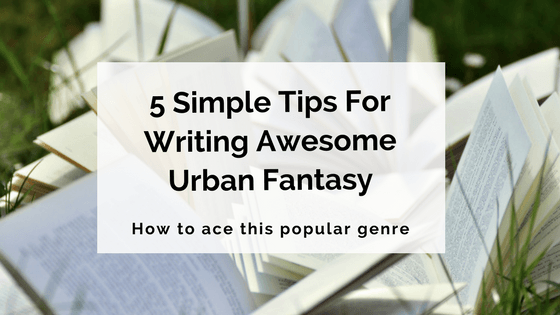Urban fantasy is one of the most popular fantasy subgenres around. Defined as stories with magical or supernatural elements that take place in a contemporary city or town setting, the urban fantasy category includes the likes of authors such as Patricia Briggs, Cassandra Clare, Neil Gaiman and Jim Butcher.

Its definition seems simple, but what does it take to create a truly engaging urban fantasy story that readers will devour?
Let’s dive into five easy tips for writing incredible urban fantasy.
1. Create an immersive setting
Perhaps the most important aspect of urban fantasy is its setting.
Whether it’s a big city, an outer suburb or some other spin on the urban setting, the world of your story should be so vivid and well-developed that it’s basically a character in itself.
Here are some quick tips to help you create a truly immersive urban fantasy setting:
- Spend some time world-building off-page before you start writing for real. This will help you immerse yourself in the world of your story, so that once you start writing, a stronger sense of setting will naturally shine through.
- Draw inspiration from real-life urban environments to create a realistic setting: think about the buildings, the streetscapes, the people, the sounds and smells…
- Or go one step further and create an alternative urban fantasy version of an actual city.
- Show the setting through the eyes of your characters. If the world is new to them, have your reader discover it alongside them; if it’s familiar, explore what they love and hate about it by weaving setting description throughout the narrative.

2. Balance magic with reality
Magic is one of the elements every fantasy novel needs, and urban fantasy is no exception. However, urban fantasy differs from other fantasy subgenres (such as traditional/high fantasy) in the way it balances its magical aspects with elements of reality.
While a lot of fantasy books are set in entirely fantastical worlds populated with magical people (or people who are all aware of the existence of magic), urban fantasy generally features a realistic setting with ‘normal’ humans alongside its magical people and creatures.
The magic or paranormal aspects are often hidden in plain sight – existing in the real world right under humans’ noses. Alternatively, the real world might know that these aspects exist; this is often utilised as a source of conflict.
However you choose to present the magical aspects of your urban fantasy, you must ensure they’re always blended with some measure of reality. As author Emma Jane Holloway defines it:
Urban fantasy is about the junction of our everyday modern world with the realm of the fantastic.”

3. Craft killer action scenes
Readers of urban fantasy expect a healthy dose of action.
Whether it’s a thrilling fight scene or a heart-pounding chase through city streets, injecting plenty of action into your story will satisfy readers and keep them turning those pages.
As well as creating excitement and advancing the story, action scenes are also a great place to explore conflict and tension and develop your characters.
Of course, you’ll need quieter moments in between your fast-paced scenes to balance things out and let your readers (and characters) breathe for a bit. But action is one of the most common elements of urban fantasy stories, and readers will expect to see it.
Speaking of what readers expect to see… Let’s take a moment to talk about tropes.

4. Present a fresh take on common tropes
All genres of fantasy are at risk of becoming rife with clichés, and urban fantasy is no different. How many times, for example, have you seen an urban fantasy story with a love triangle (usually between a human girl and two paranormal-creature-men, at least one of whom is dark and brooding…)?
It’s important to avoid turning readers off with clichés when writing urban fantasy. However, clichés aren’t to be confused with tropes.
A trope is simply an aspect that appears consistently throughout many books in a genre – it doesn’t necessarily mean it’s a bad aspect. In fact, readers expect tropes to some level. They expect to see at least a few of the things they’re familiar with and like about the genre when they pick up an urban fantasy book.
As author Adam Heine points out:
ALL STORIES HAVE TROPES. A story is good or bad based on how those tropes are used. What we like about tropes is familiarity (‘Yay, ninjas!’), excitement (‘Oo, the hero’s going to get all awesome on the badguys!’), and especially when our favorite tropes are twisted in interesting ways (‘I did NOT see that coming’). What we don’t like is when tropes are predictable to the point of boredom. That’s when a trope becomes a cliché.”
To avoid boring your readers with something they’ve seen a hundred times before, identify any tropes you’re making use of and ensure you’re exploring them in a fresh, original way.
For example, if your story involves paranormal or mythological creatures that have been slightly overused in recent years (such as vampires or werewolves), try to present a fresh take or reimagining of those creatures, or create new ones entirely.

5. Write a series if you can
Generally, urban fantasy readers are more likely to engage with a series rather than a standalone novel.
Just take a look at all the popular and successful urban fantasy series out there – it’s clear that readers like to get invested in multiple books featuring the same setting and characters.
If your urban fantasy story is suited to being split into a series, you should think about doing so. Take some time to expand your world and develop your story into a multi-book experience.
Not only will it appeal to your audience, but you’ll also experience the many other benefits of writing a fantasy series, from increased sales potential to a clearly established brand and identity as an urban fantasy author.

***
If you write urban fantasy, what are your top tips? If not, what’s your favourite urban fantasy read?
Let us know in the comments below!
4 responses to “5 Simple Tips For Writing Awesome Urban Fantasy”
This was a wonderful and very encouraging article! I’m currently working on the second draft of my first urban fantasy novel… or my first novel ever, cause I never finished a draft before. This tips are quite useful. I would like to stress the balance between magic and reality. I think authors many times neglect reality in their stories (in? on? I’m chilean, please bear with my english). Wounds take time to heal. The police will be interested in solving a crime, even if the dead one is a monster. They don’t know Mario Morales was a vampire, so if Mario’s head show up by the riverside, the police and the district’s attorney office will get involved. More times than not, the police actually solves crimes (I’m an optimist, ok?), so don’t forget about them.
I don’t know what it’s like in other countries, but in mine… PARENTS USUALLY CARE ABOUT THEIR CHILDREN. If your child was suposed to come back from school at 5, and he/she hasn’t arrived at 8, that mother/father/guardian will get worried sick, will call everybody, go to the police and start looking through social media. By the second day of the disappearence they will be crying for help in the TV, and organizing the community for the search.
A character that goes through many dangerous situations, with his life constantly in the line will probably get serious psychological issues which won’t disappear just because their love interest kissed them. Specially young characters WILL NEED the support of an understanding and caring adult: their parents, another relative, a teacher, ANYONE.
Teenagers are teenagers. I’m a teacher, believe me, I know. Teenagers lack the experience and the knowledge to solve every real-life problem, so it will be probably the same for paranormal problems. The level of tech savviness a teenager will have quite probably won’t suffice to hack the city’s security cameras. The level of medical knowledge of untrained characters is limited. A teenager won’t necessarily be a veteran soldier… he has been probably active “in the fight” for what, two years? two months? Certainly not enough for being an expert, all confident. The same goes for the romantic matters. A teenaged Casanova is ,at least, pretty rare. Even the body of a teenager is not completely developed, so they’re not as strong or fast as an adult. Sorry for the digression, but many urban fantasy novels have a teenaged protagonist and it has always bothered me to see them being more like adults. Teenagers are insecure. Once I had a smart 17 year old crying bitterly on my shoulder cause she forgot the text of her school play on stage, even when nobody noticed.
Bottom line: to write great fantasy, you need to be as realistic as you can. Or at least, that’s my take.
Love your comments, thank you. And it’s ‘in’. WINK
I’m a romance writer but still I found your post interesting especially about the tropes. Nothing is original, we know that but a little twist can make all the difference.
Totally agree, Barbara! There’s always something you can do to ensure you’re satisfying readers with the elements they want to see, but also putting your own spin on them. Best of luck with your writing. 🙂